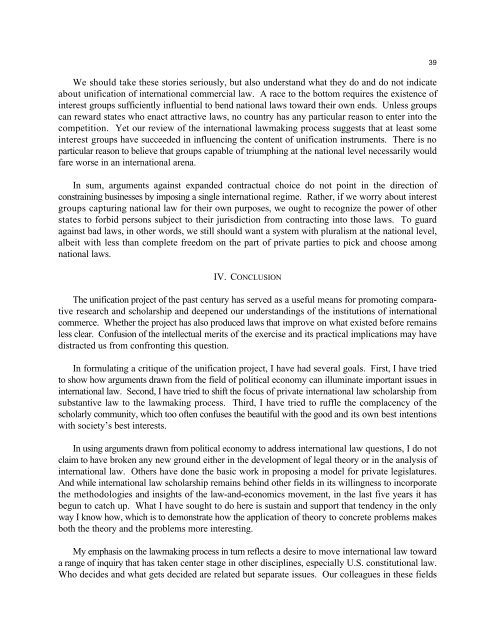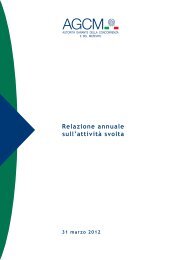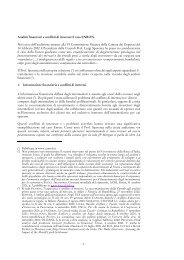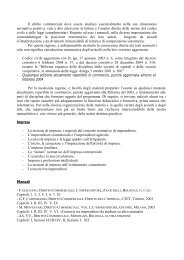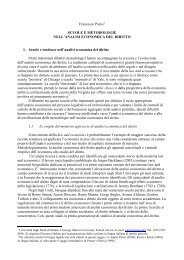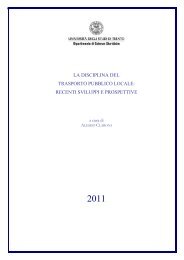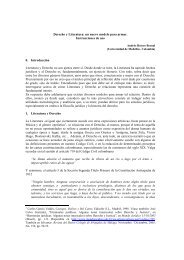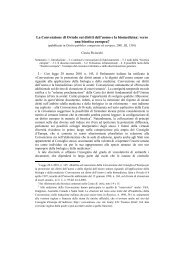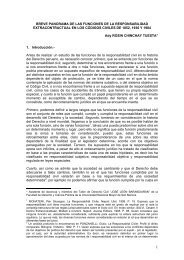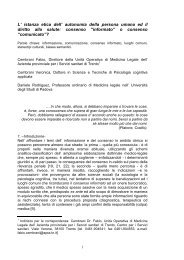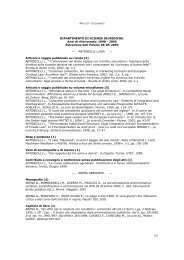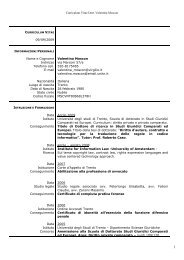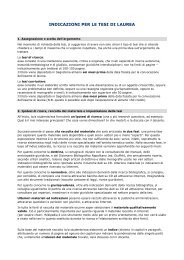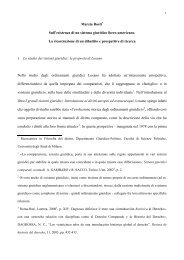The Futility of Unification and Harmonization in International ...
The Futility of Unification and Harmonization in International ...
The Futility of Unification and Harmonization in International ...
Create successful ePaper yourself
Turn your PDF publications into a flip-book with our unique Google optimized e-Paper software.
We should take these stories seriously, but also underst<strong>and</strong> what they do <strong>and</strong> do not <strong>in</strong>dicateabout unification <strong>of</strong> <strong>in</strong>ternational commercial law. A race to the bottom requires the existence <strong>of</strong><strong>in</strong>terest groups sufficiently <strong>in</strong>fluential to bend national laws toward their own ends. Unless groupscan reward states who enact attractive laws, no country has any particular reason to enter <strong>in</strong>to thecompetition. Yet our review <strong>of</strong> the <strong>in</strong>ternational lawmak<strong>in</strong>g process suggests that at least some<strong>in</strong>terest groups have succeeded <strong>in</strong> <strong>in</strong>fluenc<strong>in</strong>g the content <strong>of</strong> unification <strong>in</strong>struments. <strong>The</strong>re is noparticular reason to believe that groups capable <strong>of</strong> triumph<strong>in</strong>g at the national level necessarily wouldfare worse <strong>in</strong> an <strong>in</strong>ternational arena.In sum, arguments aga<strong>in</strong>st exp<strong>and</strong>ed contractual choice do not po<strong>in</strong>t <strong>in</strong> the direction <strong>of</strong>constra<strong>in</strong><strong>in</strong>g bus<strong>in</strong>esses by impos<strong>in</strong>g a s<strong>in</strong>gle <strong>in</strong>ternational regime. Rather, if we worry about <strong>in</strong>terestgroups captur<strong>in</strong>g national law for their own purposes, we ought to recognize the power <strong>of</strong> otherstates to forbid persons subject to their jurisdiction from contract<strong>in</strong>g <strong>in</strong>to those laws. To guardaga<strong>in</strong>st bad laws, <strong>in</strong> other words, we still should want a system with pluralism at the national level,albeit with less than complete freedom on the part <strong>of</strong> private parties to pick <strong>and</strong> choose amongnational laws.39IV. CONCLUSION<strong>The</strong> unification project <strong>of</strong> the past century has served as a useful means for promot<strong>in</strong>g comparativeresearch <strong>and</strong> scholarship <strong>and</strong> deepened our underst<strong>and</strong><strong>in</strong>gs <strong>of</strong> the <strong>in</strong>stitutions <strong>of</strong> <strong>in</strong>ternationalcommerce. Whether the project has also produced laws that improve on what existed before rema<strong>in</strong>sless clear. Confusion <strong>of</strong> the <strong>in</strong>tellectual merits <strong>of</strong> the exercise <strong>and</strong> its practical implications may havedistracted us from confront<strong>in</strong>g this question.In formulat<strong>in</strong>g a critique <strong>of</strong> the unification project, I have had several goals. First, I have triedto show how arguments drawn from the field <strong>of</strong> political economy can illum<strong>in</strong>ate important issues <strong>in</strong><strong>in</strong>ternational law. Second, I have tried to shift the focus <strong>of</strong> private <strong>in</strong>ternational law scholarship fromsubstantive law to the lawmak<strong>in</strong>g process. Third, I have tried to ruffle the complacency <strong>of</strong> thescholarly community, which too <strong>of</strong>ten confuses the beautiful with the good <strong>and</strong> its own best <strong>in</strong>tentionswith society’s best <strong>in</strong>terests.In us<strong>in</strong>g arguments drawn from political economy to address <strong>in</strong>ternational law questions, I do notclaim to have broken any new ground either <strong>in</strong> the development <strong>of</strong> legal theory or <strong>in</strong> the analysis <strong>of</strong><strong>in</strong>ternational law. Others have done the basic work <strong>in</strong> propos<strong>in</strong>g a model for private legislatures.And while <strong>in</strong>ternational law scholarship rema<strong>in</strong>s beh<strong>in</strong>d other fields <strong>in</strong> its will<strong>in</strong>gness to <strong>in</strong>corporatethe methodologies <strong>and</strong> <strong>in</strong>sights <strong>of</strong> the law-<strong>and</strong>-economics movement, <strong>in</strong> the last five years it hasbegun to catch up. What I have sought to do here is susta<strong>in</strong> <strong>and</strong> support that tendency <strong>in</strong> the onlyway I know how, which is to demonstrate how the application <strong>of</strong> theory to concrete problems makesboth the theory <strong>and</strong> the problems more <strong>in</strong>terest<strong>in</strong>g.My emphasis on the lawmak<strong>in</strong>g process <strong>in</strong> turn reflects a desire to move <strong>in</strong>ternational law towarda range <strong>of</strong> <strong>in</strong>quiry that has taken center stage <strong>in</strong> other discipl<strong>in</strong>es, especially U.S. constitutional law.Who decides <strong>and</strong> what gets decided are related but separate issues. Our colleagues <strong>in</strong> these fields


